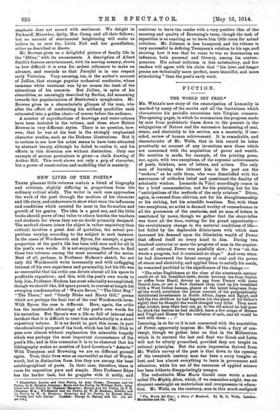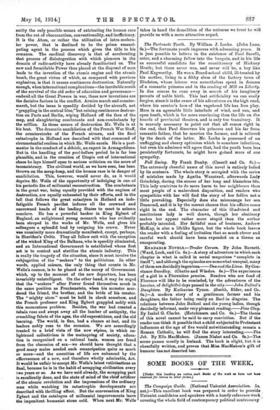FICTION.
THE WORLD SET FREE.*
Mg. WELLS'S new story of the emancipation of humanity is. marked by many of the merits and all the limitations which characterize his periodic excursions into Utopian romance.
The opening pages, in which he summarizes the progress made by man from prehistoric times down to the present in the subjugation of Nature and the successive harnessing of coal, steam, and electricity to his service, are a masterly, if one- sided, review of human achievement. It is remarkable, and characteristic of Mr. Wells, that in this record he takes practically no account of any inventions save those which, are concerned with the acquisition of power and wealth.
No mention is made, for example, of the printing press, nor, again, with two exceptions, of the supreme achievements. of poets, thinkers, men of letters, and artists. The only men of learning who interest him in the past are the "seekers," as he calls them, who were dissatisfied with the assurances of orthodox belief and questioned the finality of scholastic wisdom. Leonardo da Vinci accordingly comes in for a brief commendation, not for his painting, but for his " anticipations of the methods of the early aviators." Diirer, again, is rescued from oblivion, not for his draughtsmanship or his etching, but his scientific treatises. But, with these two exceptions, no artist is deemed worthy of remembrance in all the procession of the centuries, and no man of letters is mentioned by name, though we gather that the story-teller was there all the time, waiting for his grand opportunity— the revolutioniry change in the material conditions of life— but foiled by the deplorable dilatoriness with which man increased his demand upon the illimitable wealth of Power that offered itself on every hand to him. During two hundred centuries or more the progress of man in the acquire- ment of external Power was painfully slow; it was "on the whole a progress, but it contained no steps." And even when he bad discovered the latent energy of coal and the power of steam and electricity, and applied them to satisfy his needs, he remained purblind to the significance of the change
r- " The sober Englishman at the elms of the nineteenth century could sit at his breakfast-table, decide between tea from Ceylon or coffee from Brazil, devour an egg from France with some- Danish ham, or eat a New Zealand chop, wind up his breakfast with a West Indian banana, glance at the latest telegrams from all the world, scrutinize the prices current of his geographically distributed investments in South Africa, Japan and Egypt, and tell the two children he had begotten (in the place of his father's eight) that be thought the world changed very little. They must play cricket, keep their hair cut, go to the old school he had gone to, shirk the lessons he had shirked, learn a few scrape of Horace- and Virgil and Homer for the confusion of cads, and all would be well with them. . .
Learning, in so far as it is not concerned with the acquisition. of Power, apparently inspires Mr. Wells with a fury of con- tempt, though we gather later on that in the Millennium which is to succeed the last and final war Greek and Latin will not be utterly proscribed, provided they are taught on rational principles. But the main impression derived from. Mr. Wells's survey of the past is that down to the opening of the twentieth century man has been a sorry bungler at best, and has almost everything to learn in governance and education, while his use of the resources of applied science has been hitherto disappointingly meagre.
The redoubtable Miss Marie Corelli once wrote a novel called The Mighty Atom, which, if we remember aright, was am eloquent onslaught on materialisni and overpressure in educa- tion. Mr. Wells, on the contrary, sees in this much-maligned
• The World Set FT. 17 a Story of Mankind. By B, G, Wells. Lendoar Macmillan and Co. Leal entity the only possible means of extricating the human race from the rut of obscurantism, conventionality, and inefficiency. It is the Atom, or rather the utilization of intra-molecu- lar power, that is destined to be the prime emanci- pating agent in the process which gives the title to his romance. The cardinal discovery is that of accelerating that process of disintegration with which pioneers in the domain of radio-activity have already familiarized us. The new and formidable Power thus placed at the disposal of man leads to the invention of the atomic engine and the atomic bomb, the great virtue of which, as compared with previous explosives, is that it causes continuous destruction. Naturally enough, when international complications—the inevitable result of the survival of the old order of education and governance— embroil all the Great Powers in war, these new inventions are the decisive factors in the conflict. Armies march and counter- march, but the issue is speedily decided by the aircraft, not "grappling in the central bine," but raining continuous destruc- tion on Paris and Berlin, wiping Holland off the face of the map, and slaughtering combatants and non-combatants by the million. In these scenes of destruction Mr. Wells is at his best. The dramatic annihilation of the French War Staff, the counterstroke of the French airmen, and the final catastrophe in Holland are described with that command of circumstantial realism in which Mr. Wells excels. He is a past- master in the conduct of a debacle, an expert in Armageddons. But in the handling of the post-bellum period he is far less plausible, and in the creation of Utopia out of international chaos he lays himself open to serious criticism on the score of inconsistency. The civilized world, as we have seen, has been thrown on the scrap-heap, and the human race is in danger of annihilation. This, however, would never do, as it would deprive Mr. Wells of the opportunity of indulging in one .of his periodic fits of millennial reconstruction. The combatants in the great war, being equally provided with the engines of destruction, are equally exhausted by their efforts, and in the lull that follows the great cataclysm in Holland an inde- fatigable French pacifist induces all the crowned and uncrowned heads of the leading States to meet in solemn conclave. He has a powerful backer in King Egbert of England, an enlightened young monarch who has evidently been steeped in the works of Mr. Wells, and gives his colleagues a splendid lead by resigning his crown. Never was unanimity more dramatically manifested, except, perhaps, in Sheridan's Critic. They all follow suit with the exception of the wicked King of the Balkans,who is speedily eliminated, and an International Government is established whose first act is to control and eternize the atomic industry. This is really the tragedy of the situation, since it must involve the subjugation of the "seekers" to the politicians. In other words, applied science, the only thing that counts in Mr. Wells's cosmos, is to be placed at the mercy of Government which, up to the moment of the new departure, has been invariably unintelligent. On the other hand, it may be urged that the " seekers " after Power found themselves much in the same position as Frankenstein, when his monster mur- dered the friend, the brother, and the bride of his creator. The "mighty atom" must be held in check somehow, and the French professor and King Egbert grappled nobly with this momentous problem. Besides, the war had created a tabula rasa and swept away all the lumber of antiquity, the crumbling fabric of the ages, the old superstitions, and the old learning. The world, in fine, had a chance at last, and its leaders nobly rose to the occasion. We are accordingly treated to a brief vista of the new regime, in which en- lightened collectivism is the mainspring of society, educa- tion is reorganized on a rational basis, women are freed from the obsession of sex—we should have thought that a good many males needed such emancipation quite as much or more—and the amenities of life are enhanced by the efflorescence of a new, and therefore wholly admirable, Art. It would be unfair to accept Mr. Wells's latest vaticinations as final, because he is in the habit of scrapping civilization every two years or so. As we have said already, the scrapping part is excellently done, and the state of mind of the chief artificer of the atomic revolution and the impressions of the ordinary man while watching its catastrophic developments are described with thrilling effect. But the conversation of King Egbert and the catalogue of millennial improvements leave the impenitent humanist stone cold, When next Mr. Wells
takes in hand the demolition of the universe we trust be will provide us with a more attractive sequel.











































 Previous page
Previous page